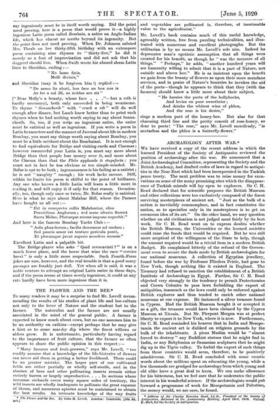ARCHAEOLOGY AFTER WAR.*
WE have received a copy of the recent address in which the learned President of the Society of Antiquaries reviewed the position of archaeology after the war. He announced that a Joint Archaeological Committee, representing the Society and the British Academy, had drafted codes of laws in regard to antiqui- ties in the Near East which had been incorporated in the Turkish peace treaty. The next problem was to raise money for exca- vations on some of the many promising sites which the disappear- ance of Turkish misrule will lay open to explorers. Sir C. H. Read declared that for scientific purposes the British Museum and other collections were too exclusively composed of the finest surviving masterpieces of ancient art. " Just as the bulk of a nation is inevitably commonplace, and in fact constitutes the nation, so to specialize only in its masterpieces is to get an erroneous idea of its art." On the other hand, we may question whether an old civilization is not judged most fairly by its best work. Sir C. H. Read went on to express doubts whether the British Museum, the Universities or the learned societies could raise the funds that would be required. But he was still more sceptical of the willingness of the State to help, though the amount required would be a trivial item in a modern British Budget. He complained bitterly of the refusal of the Govern. ment even to secure the finds made by British archaeologists for our national museums. A collection of Egyptian jewellery, found before the war by Professor Flinders Petrie, had gone to New York, though nothing like it existed in England. The Treasury had refused to sanction the establishment of a British Institute of Archaeology in Egypt. Further, Sir C. H. Read objected very strongly to the tendency to permit Protectorates and Crown Colonies to pass laws forbidding the export of antiquities, inasmuch as the laws could only be enforced against British explorers and thus tended to enrich other national museums at our expense. He instanced a silver treasure found in Cyprus. Had the British Museum bought it or accepted it as a gift, the treasure would have been claimed by the Cyprus Museum at Nicosia. But Mr. Pierpont Morgan was at perfect liberty to export it to New York, where it is now. Furthermore, Sir C. H. Read reminded his hearers that in India and Mesopo- tamia the ancient art is disliked on religious grounds by the bulk of the inhabitants. A pious Muslim would be " almost forced to destroy " any Buddhist statues that he might find in India, or any Babylonian or Sassanian sculptures that he might dig up in the Tigris valley. To forbid the export of such things from these countries would seem, therefore, to be positively mischievous. Sir C. H. Read concluded with some caustic words about the millions spent on educating the young, while a few thousands are grudged for archaeology from which young and old alike have a great deal to learn. We can make allowance for his bitterness, but we feel sure that he underrates the public interest in his wonderful science. If the archaeologists would put forward a programme of work for Mesopotamia and Palestine, the money would, we are sure, be found.
• Address of Sir Charles Hercules Read, LL.D.. President of the Society of Antiquaries, delivered at the Anniversary Meeting. April 23rd, 1920. Oxford: F. Ball, for the Sudety of Antiquaries.


































 Previous page
Previous page